Health Innovation Through Collaboration
Three ways UNC Charlotte is fueling the effort to foresee and fight infectious diseasesHealth Innovation Through Collaboration
Three ways UNC Charlotte is fueling the effort to foresee and fight infectious diseasesHealth Innovation Through Collaboration
Three ways UNC Charlotte is fueling the effort to foresee and fight infectious diseasesDe-CIPHER-ing threats to human health
As the scientific community predicts the emergence of new pandemics – and other prolonged health problems – sooner rather than later, Charlotte is looking ahead.
At UNC Charlotte, Dan Janies and Adam Reitzel are leading CIPHER – the Center for Computational Intelligence to Predict Health and Environmental Risks. With a mission to understand, prevent and combat future outbreaks of known and unknown infectious diseases, CIPHER’s researchers – a group of 20+ experts from bioinformatics, engineering and data science to biology, mathematics and computer science, and more – are combining forces to identify vital connections among the world’s natural environment, interactions with animals and human health.
“Keys to curbing the current pandemic and abating the next are found at UNC Charlotte,” said Janies, the Carol Grotnes Belk Distinguished Professor of Bioinformatics and Genomics. “With our focus on computational and empirical research, we are able to tackle some of society’s most vexing challenges such as antibiotic resistance, food safety and ecosystem health.”
“The investment in CIPHER for new equipment, labs, shared spaces and people is critical to improving the speed, accuracy, and cost-effectiveness of our research.”
-Adam Reitzel, professor of biological sciences
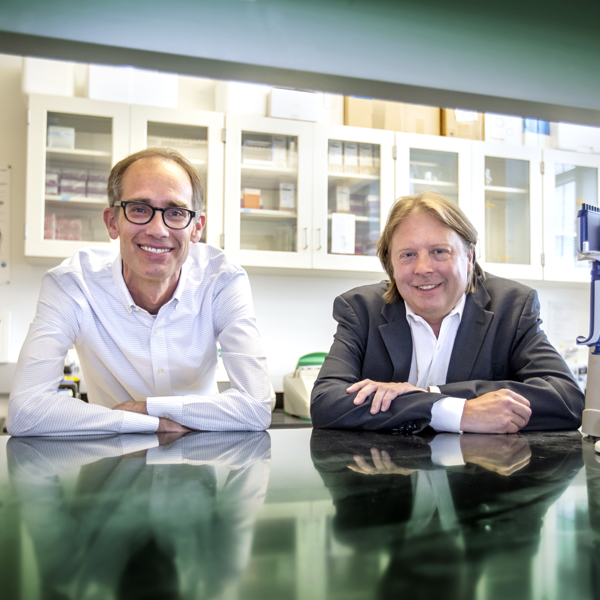
New CIPHER Facilities: February 2023
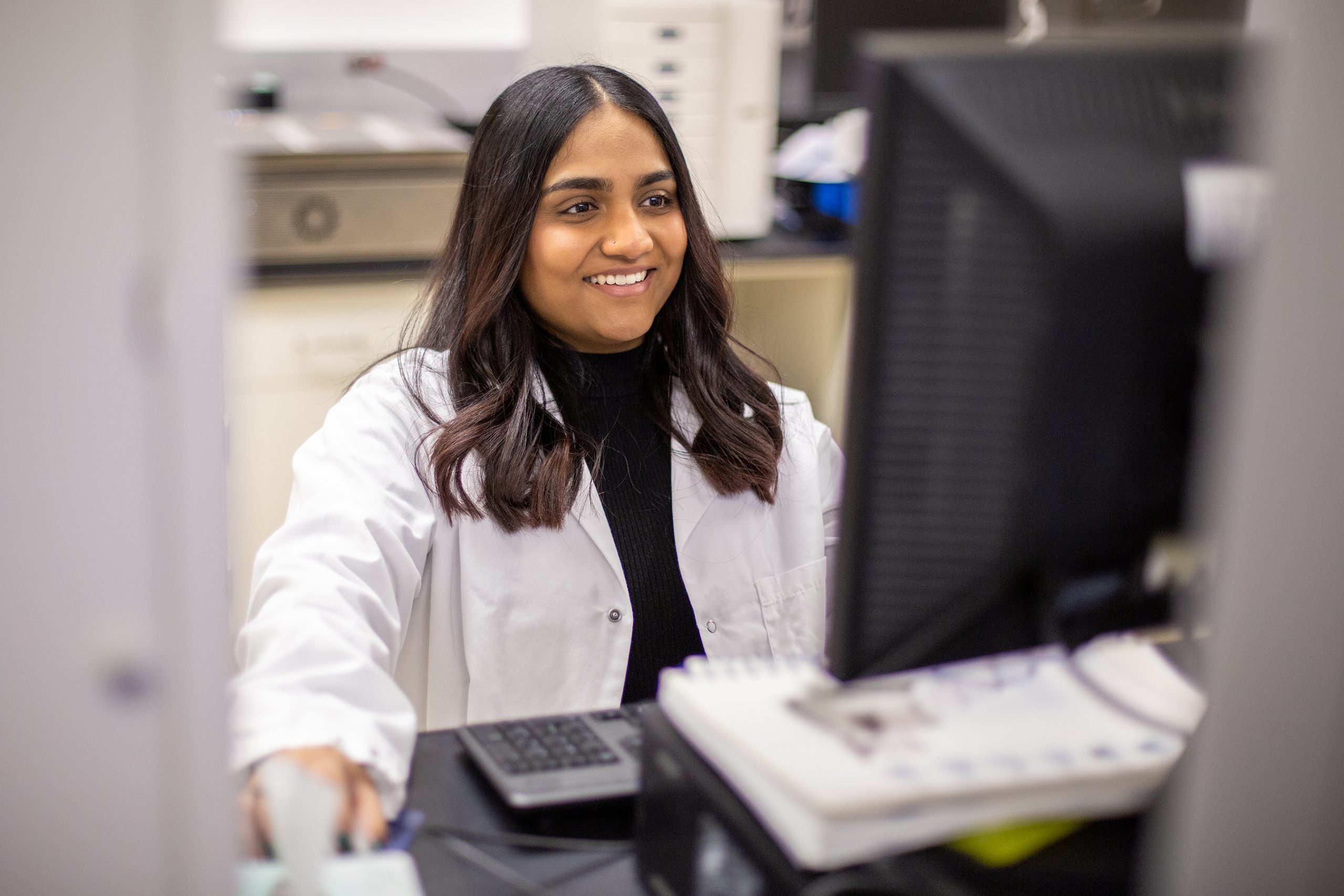
14 computational research labs
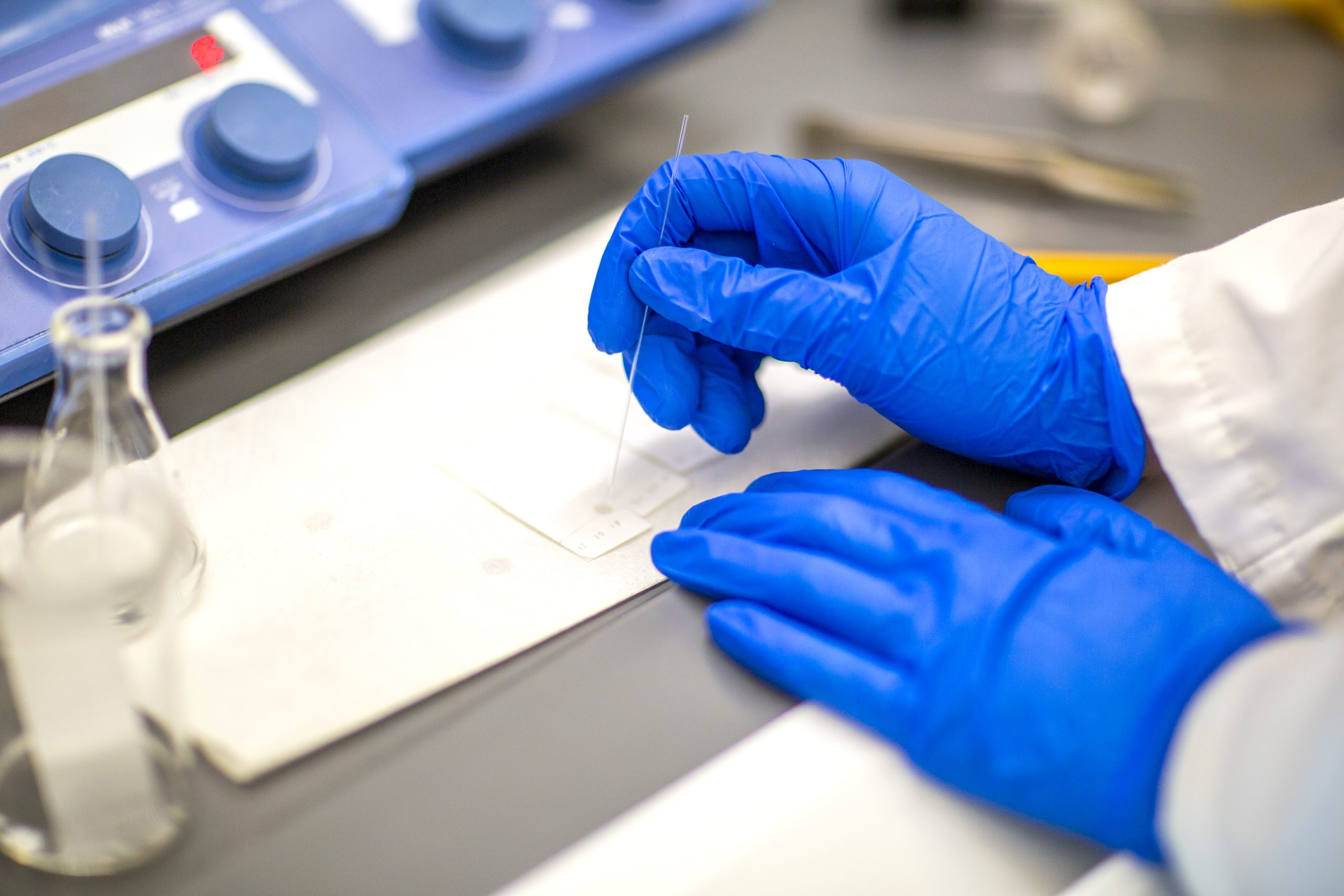
10 wet labs
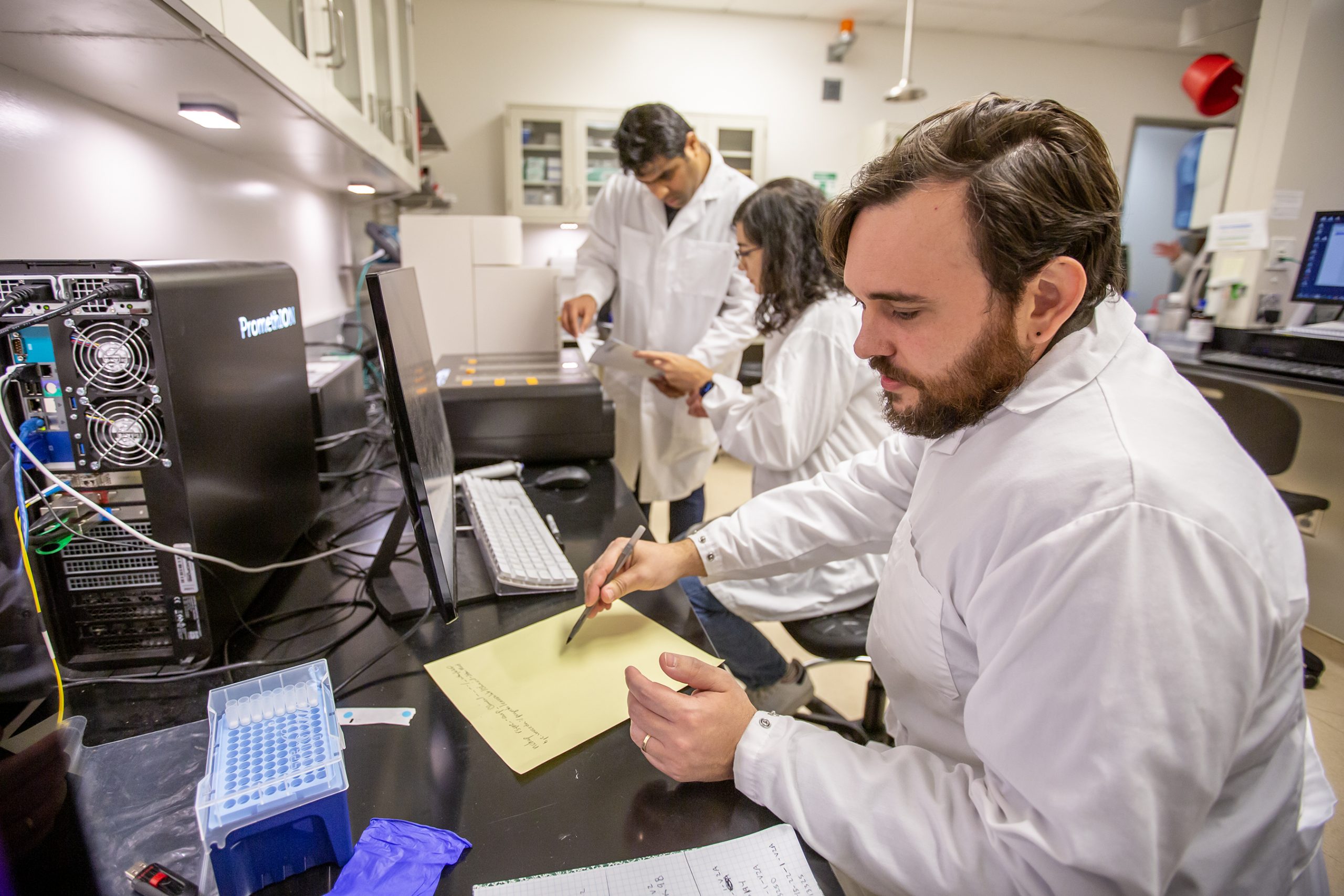
State-of-the-art spaces for students and visiting scientists
De-CIPHER-ing threats to human health
As the scientific community predicts the emergence of new pandemics – and other prolonged health problems – sooner rather than later, Charlotte is looking ahead.
At UNC Charlotte, Dan Janies and Adam Reitzel are leading CIPHER – the Center for Computational Intelligence to Predict Health and Environmental Risks. With a mission to understand, prevent and combat future outbreaks of known and unknown infectious diseases, CIPHER’s researchers – a group of 20+ experts from bioinformatics, engineering and data science to biology, mathematics and computer science, and more – are combining forces to identify vital connections among the world’s natural environment, interactions with animals and human health.
“Keys to curbing the current pandemic and abating the next are found at UNC Charlotte,” said Janies, the Carol Grotnes Belk Distinguished Professor of Bioinformatics and Genomics. “With our focus on computational and empirical research, we are able to tackle some of society’s most vexing challenges such as antibiotic resistance, food safety and ecosystem health.”
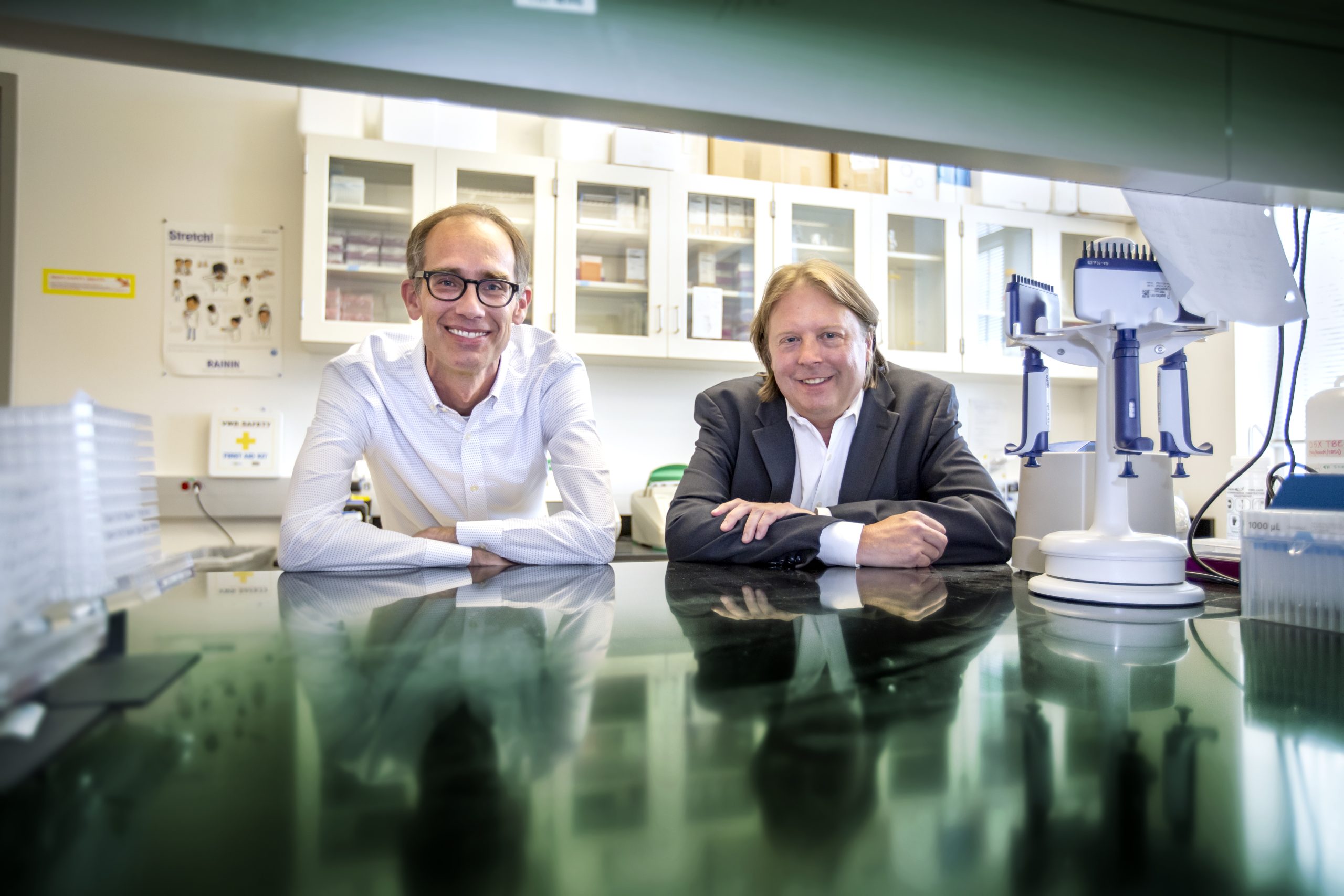
“The investment in CIPHER for new equipment, labs, shared spaces and people is critical to improving the speed, accuracy, and cost-effectiveness of our research.”
-Adam Reitzel, professor of biological
sciences and genomics
New CIPHER Facilities: February 2023

14 computational research labs

10 wet labs

State-of-the-art spaces for students and visiting scientists
De-CIPHER-ing threats to human health
As the scientific community predicts the emergence of new pandemics – and other prolonged health problems – sooner rather than later, Charlotte is looking ahead.
At UNC Charlotte, Dan Janies and Adam Reitzel are leading CIPHER – the Center for Computational Intelligence to Predict Health and Environmental Risks. With a mission to understand, prevent and combat future outbreaks of known and unknown infectious diseases, CIPHER’s researchers – a group of 20+ experts from bioinformatics, engineering and data science to biology, mathematics and computer science, and more – are combining forces to identify vital connections among the world’s natural environment, interactions with animals and human health.
“Keys to curbing the current pandemic and abating the next are found at UNC Charlotte,” said Janies, the Carol Grotnes Belk Distinguished Professor of Bioinformatics and Genomics. “With our focus on computational and empirical research, we are able to tackle some of society’s most vexing challenges such as antibiotic resistance, food safety and ecosystem health.”

“The investment in CIPHER for new equipment, labs, shared spaces and people is critical to improving the speed, accuracy, and cost-effectiveness of our research.”
-Adam Reitzel, professor of biological sciences
New CIPHER Facilities: February 2023

14 computational research labs

10 wet labs

State-of-the-art spaces for students and visiting scientists
Global Guardians
An interdisciplinary approach to predicting the spread of disease
Not all superheroes wear capes. Some don lab coats and goggles as they use their scholarly powers for identifying new ways to predict and thwart the threat of planet-wide pandemics. Meet four UNC Charlotte “superhero researchers” — who are joining forces to make sure future widespread outbreaks of communicable disease are never again a surprise or unmanageable.
Laurel Yohe
Bat Wrangler
Juan Vivero-Escoto
Bacteria Destroyer
Mariya Munir
Wastewater Detective
Shi Chen
Data Mapper
“Sometimes you have to look at the bigger picture and borrow knowledge from specialties other than your own.”
–Dan Janies, professor of bioinformatics and genomics
Global Guardians
An interdisciplinary approach to predicting the spread of disease
Not all superheroes wear capes. Some don lab coats and goggles as they use their scholarly powers for identifying new ways to predict and thwart the threat of planet-wide pandemics. Meet four UNC Charlotte “superhero researchers” — who are joining forces to make sure future widespread outbreaks of communicable disease are never again a surprise or unmanageable.
Laurel Yohe
Bat Wrangler
Juan Vivero-Escoto
Bacteria Destroyer
Mariya Munir
Wastewater Detective
Shi Chen
Data Mapper
“Sometimes you have to look at the bigger picture and borrow knowledge from specialties other than your own.”
–Dan Janies, professor of bioinformatics and genomics
 Global Guardians
Global Guardians
An interdisciplinary approach to predicting the spread of disease
Not all superheroes wear capes. Some don lab coats and goggles as they use their scholarly powers for identifying new ways to predict and thwart the threat of planet-wide pandemics. Meet four UNC Charlotte “superhero researchers” — who are joining forces to make sure future widespread outbreaks of communicable disease are never again a surprise or unmanageable.
Laurel Yohe
Bat Wrangler
Juan Vivero-Escoto
Bacteria Destroyer
Mariya Munir
Wastewater Detective
Shi Chen
Data Mapper
“Sometimes you have to look at the bigger picture and borrow knowledge from specialties other than your own.”
–Dan Janies, professor of bioinformatics and genomics
Fighting COVID-19 from the sewer up
“The COVID-19 pandemic presented one of the most exciting opportunities for researchers since any of us have been scientists,” said UNC Charlotte bioinformatics researcher Cynthia Gibas.
From COVID’s onset, Gibas and a team of researchers from bioinformatics, environmental engineering, public health, and geography and earth sciences drove UNC Charlotte’s effort to combat the virus through a novel approach to detecting the virus in the campus sewer system.
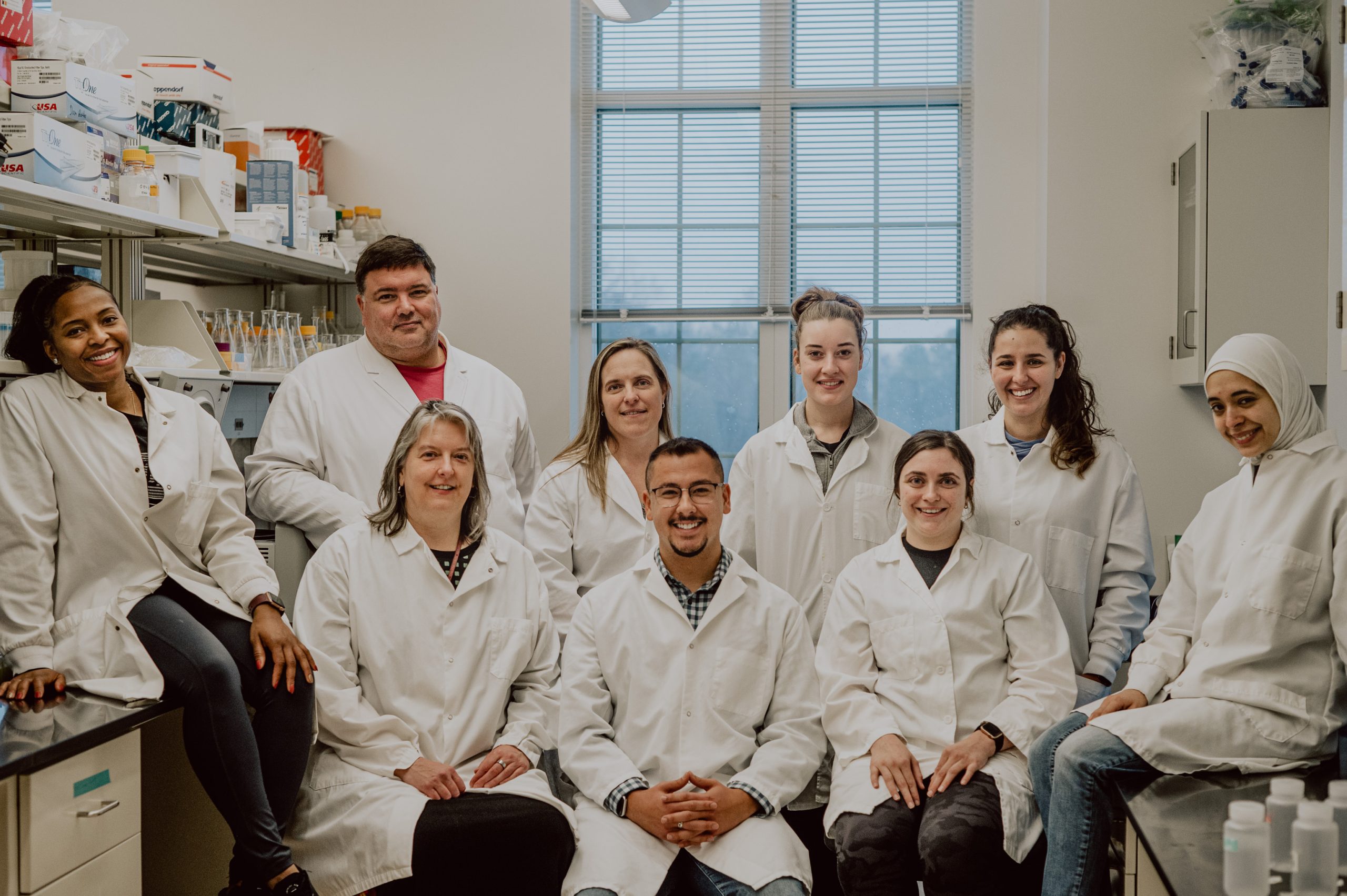
Thanks to a comprehensive set of tactics to mitigate the incidence of the disease – with wastewater sampling and its testing at the effort’s center – the presence of COVID-19 on campus through the pandemic was remarkably manageable and resulted in few disruptions throughout the pandemic. The team’s track record caught the attention of local officials and the University became a partner with the county to extend wastewater sampling to select area neighborhoods.
Their innovation helped earn the university a 2021 AASCU Excellence and Innovation Award – and state-level funding for CIPHER’s facilities and additional new faculty. Now, with new support from the North Carolina Department of Health and Human Services and nearby Cabarrus County, UNC Charlotte is sequencing viral variants from samples collected by the North Carolina Wastewater Monitoring Network Project and setting up new wastewater monitoring sites in four additional counties.
“COVID-19 is here to stay. UNC Charlotte has demonstrated the virus can be managed – through vaccines and boosters, by using available and new technologies to surveil and test, and by partnering creatively to keep communities as safe as possible.”
–Cynthia Gibas, professor of bioinformatics and genomics
Read more about UNC Charlotte’s innovative health successes:
Learn More about Success Happening Only at Charlotte
Fighting COVID-19 from the sewer up

“The COVID-19 pandemic presented one of the most exciting opportunities for researchers since any of us have been scientists,” said UNC Charlotte bioinformatics researcher Cynthia Gibas.
From COVID’s onset, Gibas and a team of researchers from bioinformatics, environmental engineering, public health, and geography and earth sciences drove UNC Charlotte’s effort to combat the virus through a novel approach to detecting the virus in the campus sewer system.
Thanks to a comprehensive set of tactics to mitigate the incidence of the disease – with wastewater sampling and its testing at the effort’s center – the presence of COVID-19 on campus through the pandemic was remarkably manageable and resulted in few disruptions throughout the pandemic. The team’s track record caught the attention of local officials and the University became a partner with the county to extend wastewater sampling to select area neighborhoods.
Their innovation helped earn the university a 2021 AASCU Excellence and Innovation Award – and state-level funding for CIPHER’s facilities and additional new faculty. Now, with new support from the North Carolina Department of Health and Human Services and nearby Cabarrus County, UNC Charlotte is sequencing viral variants from samples collected by the North Carolina Wastewater Monitoring Network Project and setting up new wastewater monitoring sites in four additional counties.
“COVID-19 is here to stay. UNC Charlotte has demonstrated the virus can be managed – through vaccines and boosters, by using available and new technologies to surveil and test, and by partnering creatively to keep communities as safe as possible.”
–Cynthia Gibas, professor of bioinformatics and genomics
Read more about UNC Charlotte’s innovative health successes:
 Fighting COVID-19 from the sewer up
Fighting COVID-19 from the sewer up

“The COVID-19 pandemic presented one of the most exciting opportunities for researchers since any of us have been scientists,” said UNC Charlotte bioinformatics researcher Cynthia Gibas.
From COVID’s onset, Gibas and a team of researchers from bioinformatics, environmental engineering, public health, and geography and earth sciences drove UNC Charlotte’s effort to combat the virus through a novel approach to detecting the virus in the campus sewer system.
Thanks to a comprehensive set of tactics to mitigate the incidence of the disease – with wastewater sampling and its testing at the effort’s center – the presence of COVID-19 on campus through the pandemic was remarkably manageable and resulted in few disruptions throughout the pandemic. The team’s track record caught the attention of local officials and the University became a partner with the county to extend wastewater sampling to select area neighborhoods.
Their innovation helped earn the university a 2021 AASCU Excellence and Innovation Award – and state-level funding for CIPHER’s facilities and additional new faculty. Now, with new support from the North Carolina Department of Health and Human Services and nearby Cabarrus County, UNC Charlotte is sequencing viral variants from samples collected by the North Carolina Wastewater Monitoring Network Project and setting up new wastewater monitoring sites in four additional counties.
“COVID-19 is here to stay. UNC Charlotte has demonstrated the virus can be managed – through vaccines and boosters, by using available and new technologies to surveil and test, and by partnering creatively to keep communities as safe as possible.”
–Cynthia Gibas, professor of bioinformatics and genomics
Read more about UNC Charlotte’s innovative health successes:

